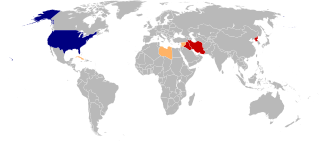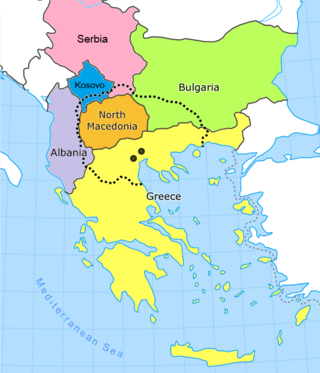Collaboration with the Axis powers may refer to:
Collaboration with the Axis powers may refer to:
An axis is an imaginary line around which an object rotates or is symmetrical. Axis may also refer to:

The phrase "axis of evil" was first used by U.S. President George W. Bush and originally referred to Iran, Iraq, and North Korea. It was used in Bush's State of the Union address on January 29, 2002, less than five months after the 9/11 attacks and almost a year before the 2003 invasion of Iraq, and often repeated throughout his presidency. He used it to describe foreign governments that, during his administration, allegedly sponsored terrorism and sought weapons of mass destruction. The notion of such an axis was used to pinpoint these common enemies of the United States and to rally the American populace in support of the War on Terror. The countries originally covered by the term were Iran, Ba'athist Iraq, and North Korea. In response, Iran formed a political alliance that it called the "Axis of Resistance" comprising Iran, Syria and Hezbollah. Other countries were later added to the "axis of evil" by US politicians and commentators. The term "axis of evil" is itself a portmanteau of the Axis powers of WWII and the Cold War era “Evil Empire”.

The Axis powers, originally called the Rome–Berlin Axis, was a military coalition that initiated World War II and fought against the Allies. Its principal members were Nazi Germany, the Kingdom of Italy, and the Empire of Japan. The Axis were united in their opposition to the Allies, but otherwise lacked comparable coordination and ideological cohesion.
Allied forces or Allied force may refer to:
Collaborator or collaborators may refer to:

Macedonia most commonly refers to:
APH, Aph, or APh may refer to:
Wartime collaboration is cooperation with the enemy against one's country of citizenship in wartime. As historian Gerhard Hirschfeld says, it "is as old as war and the occupation of foreign territory".

The Turkestan Legion was the name for the military units composed of the Turkic peoples who served in the Wehrmacht during World War II. Most of these troops were Red Army POWs who formed a common cause with the Germans. Its establishment was spearheaded by Nuri Killigil, a Turkish theorist of Pan-Turkism, which sought to separate territories inhabited by Turkic peoples from their countries and eventually unite them under Turkish rule.
Axis & Allies is a franchise series of World War II strategy board games.

The Hellenic State was the collaborationist government of Greece during the country's occupation by the Axis powers in the Second World War.

Metropolitan Joanikije Lipovac was the Metropolitan of the Diocese of Montenegro and the Littoral. He was executed by the Communist-led Yugoslav Partisans for his collaboration with occupying Axis powers during World War II. He was posthumously canonized by the Serbian Orthodox Church.

Hetalia: Axis Powers is a Japanese webcomic, later adapted as a manga and an anime series, by Hidekaz Himaruya. The series' main presentation is as an comedic allegory of political and historic events as well as more general cultural comparisons. Characters are personifications of countries, regions such as Hong Kong, and micronations. Both positive and negative cultural stereotypes form part of each character's personality. Hetalia (ヘタリア) is a portmanteau combining hetare and "Italia".
Dark Nemesis is a supervillain team appearing in American comic books published by DC Comics.

Axis & Allies: Europe 1940 is a 2010 board wargame simulating the European Theatre of World War II at the strategic level.
Collaboration is a process where two or more people or organizations work together to realise shared goals.

The siege of Turjak or Battle of Turjak was fought between 14 and 19 September 1943 at the Turjak Castle between the Slovene Partisans and the combined forces of Slovene former units of the Anti-Communist Volunteer Militia (MVAC) and Slovene Chetniks. The battle followed the Partisan victory at Battle of Grčarice. Partisans encircled the Turjak castle on 14 September and laid siege to the castle after the defenders refused to surrender. The siege ended on 19 September with a Partisan victory, in part due to the heavy weapons that they had acquired from Italian forces.

Sotirios Gotzamanis was a Greek physician and politician.
The Declaration of St James's Palace, or London Declaration, was the first joint statement of goals and principles by the Allied Powers during World War II. The declaration was issued after the first Inter-Allied Conference at St James's Palace in London on 12 June 1941. Representatives of the United Kingdom, the four co-belligerent Commonwealth Dominions, the eight governments in exile and Free France were parties to the declaration. It stated the Allies' commitment to continue the war against the Axis Powers and established principles to serve as the basis of a future peace.